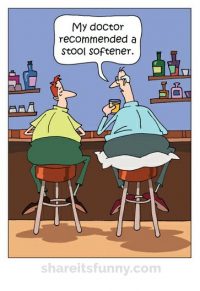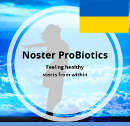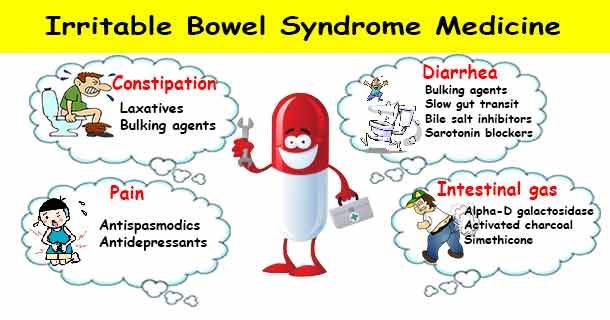IBS (Irritable Bowel Syndrome) conventional treatments are interesting because of the nature of the symptoms.
As you must be aware if you read the article on IBS (Irritable Bowel Syndrome) – What is it? and IBS (Irritable Bowel Syndrome) Diagnosis, there are 3 main groups of symptoms based on bowel movements.
- Constipation
- Diarrhoea
- Alternating between the two.
These three especially the last one makes conventional treatment a bit complex. When do you treat for constipation and when for diarrhoea?
As modern medicine is aimed at treating symptoms and not causes it means the patient has to wait for the symptoms to occur and then treat accordingly.
We will take each symptom and give the common medication used to treat the symptom.

Constipation
- The most common drug treatments are stool softeners. The best are ingredients that increase the osmotic pressure in the large intestine and this causes water to be drawn into the large intestine making the stools softer. They usually contain lactulose, a long chain sugar molecule. This is not broken down in the intestines and when it gets to the large intestine it causes water to be absorbed back into the large intestine causing soft stools. In South Africa, the original is Duphalac syrup. There are plenty of generics
- Bulk formers another commonly used stimulant. They swell in the large intestine by absorbing water. As they expand they press on the intestine wall stimulating it to contract. Psyllium Husk are examples eg Fybogel in South Africa
- The use of certain fruits such as prunes and figs is a natural way
- High fibre foods are essential even if you don’t suffer.
- Exercise is crucial, walking or running, not gym work.

Diarrhoea
- The usual drugs are smooth muscle relaxants. These include drugs containing loperamide. These do not work on the skeletal muscles only on the smooth muscle of the intestines, the large one in particular. They are very common, the original in South Africa is Imodium.
- The use of fibre foods can bind the stomach
- Stress is a big cause of IBS, medication prescribed by your doctor for stress could help the diarrhoea.
- Exercise again is crucial
Combination of the above two
- Whichever symptom is presenting take the appropriate medication.
- If you have diarrhoea then take Imodium.
- If the symptom is constipation then a stool softener
These are the conventional treatments, but as I have said in another post, I consider IBS to be an autoimmune disease.
The above treat the symptoms.
You need treatment for the cause. Read this article (IBS (Irritable Bowel Syndrome) Treatment With A Probiotic) for my recommendations


can IBS cause headaches as well?
Hi Judith,
I din’t think that IBS will cause a headache directly, but the causes of IBS may also cause the headache. As an example, stress can spark IBS and can also cause a headache. Inflammation will cause IBS and will cause a headache.
Try to sort the IBS out first and the headache will probably come right as well.
Give our probiotics a try for a couple of months and see how you feel.